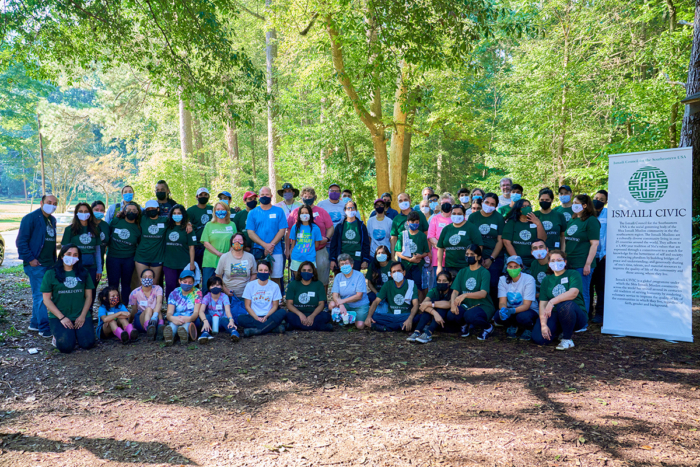Atlanta-area Episcopalians, Ismaili Muslims forge relationship through community servicePosted Nov 4, 2021 |
|

Members of the Episcopal Church of the Epiphany, Atlanta, Georgia, and the Atlanta-area Ismaili community volunteer together at South Fork Peachtree Creek in Decatur on World Rivers Day, Sept. 26. Photo: Aziz Ajaney
[Episcopal News Service] Back in February, when the Rev. Nicole Lambelet invited nearby faith leaders to participate in a virtual tour of Decatur, Georgia, through the lens of displaced Black and Jewish communities, she didn’t expect her Episcopal church to form a new relationship with Decatur’s Ismaili Muslim community.
“Probably five faith leaders responded to the mass email I sent, and 150 people came to our event, but Behnoosh Momin’s response was different,” said Lambelet, associate rector for family ministry and outreach at the Episcopal Church of the Epiphany in Atlanta.
Momin, a communications and outreach volunteer for the Ismaili Council for the Southeastern USA, declined Lambelet’s initial invitation and instead offered to start an interfaith dialogue centered on shared religious values and ethics.
Now, Epiphany parishioners in northeastern Atlanta and Ismaili community members in nearby Decatur are coming together around what they already share, to learn from each other and to look for ways to partner on projects designed to improve their shared region.
“Both of our communities believe in generosity and helping the poor and other humanitarian services,” Momin said. “Pluralism and voluntary service are important in the Ismaili Muslim faith. … We share that commonality with the Episcopal community.”
For their first joint service project, the two groups focused on environmental stewardship and partnered with Decatur-based Georgia Interfaith Power and Light, or GIPL, and Clyde Shepherd Nature Preserve. On Sept. 26, over 50 volunteers cleaned up a portion of South Fork Peachtree Creek. That date was chosen because it was both World Rivers Day and the Global Ismaili CIVIC Day.
“We’re so excited about our new Episcopalian friends and relationships, and it’s already been an incredible journey,” Momin said. “Environmental stewardship is a core ethic of the Ismaili community, and that shared value with The Episcopal Church fits very naturally to us.”
In a co-written blog post for GIPL’s website highlighting their faith communities’ joint creek cleanup service project, Lambelet and Momin mention water’s significance in both Christianity and Islam. In Christianity, for example, new members are initiated into the church through baptism by water. In Islam, water is considered a human right and symbolizes purity.
Hannah Shultz, a program associate for GIPL, a nonprofit dedicated to protecting the Earth’s ecosystems and fighting environmental injustices, said the cleanup event at Clyde Shepherd Nature Preserve represented a “beautiful example” of the many commonalities shared by faith traditions yet often overshadowed by differences.
“There’s a lot we can learn from each other,” said Shultz, who handled the cleanup event’s logistics for the Episcopal Church of the Epiphany and the Ismaili community. “I think we have our own theology and perspectives, but there’s a lot to learn from and inspire by learning about common issues. We’re learning different ideas to care for creation, but our goal is ultimately the same. Emphasis on justice really runs deep in both communities.”
Ismaili is the second-largest sect of Shia Islam, which is the second-largest branch of Islam. Like all Shia Muslims, Ismailis recognize the Prophet Muhammad’s cousin and son-in-law Ali ibn Abi Talib as his bloodline successor. Unlike the much larger Sunni branch of Islam, Shias believe that Muhammad’s successor needs to be in his bloodline. The Ismaili sect earned its name from Isma’il ibn Jafar, whom its members appointed as the true Imam, unlike the much larger Twelver Shia sect, which appointed Musa al-Kadhim instead. Today, Ismaili is the only Shia sect to have a living, ancestral Imam, formally titled Aga Khan, under the leadership of Prince Karim Al Husseini Aga Khan. Approximately 15 million Ismailis live in more than 25 countries.
Lambelet said she toured a nearby Ismaili Jamatkhana (private gathering space) and took a class on Islam while a seminarian at the Candler School of Theology at Emory University in Atlanta, but other than that, she knew little about the Ismaili community prior to meeting Momin. She also said she hopes that interfaith events between the Epiphany congregation and the Ismaili community, including visiting each other’s places of worship, will educate members from both sides and foster ongoing dialogue addressing social justice issues in and around Decatur. So far, Epiphany members have visited the Jamatkhana; Ismaili community were scheduled to visit the church at the end of October.
“There are lots of similarities and differences between the Episcopalian and Islamic faiths, and we’re very excited about the similarities and learning how we can grow from each other through our differences,” Lambelet said.
Momin said, “There’s also commonality with faith communities’ level of understanding theological concepts around social justice and eliminating inequities. If we educate each other about faith and ethics and values and commonality and connection, we can work towards that.”
The women said they plan on making future joint service projects bigger than the first one. They also hope their new partnership will not only help the greater Decatur community and their shared ecosystem, but also lead to individual growth in faith.
– Shireen Korkzan is a Midwest-based freelance reporter who primarily writes about religion, race, ethnicity and social justice issues. Follow her on Twitter and Instagram @smkrm5.

Social Menu